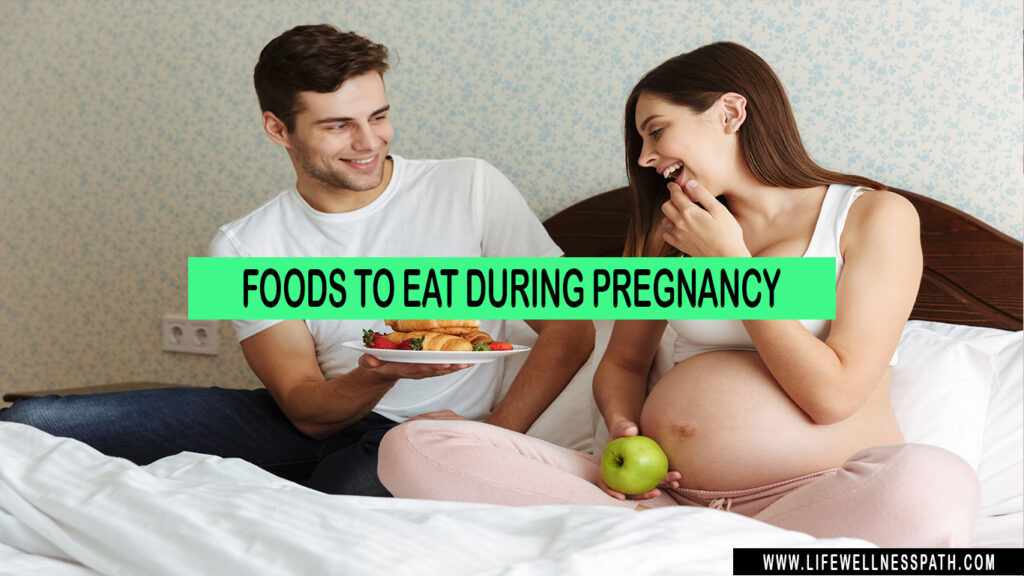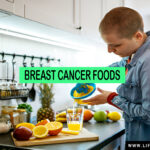Table of Contents
Introduction:
Hey there, mama-to-be! Congratulations on this incredible journey you’re embarking on. Pregnancy is such an exciting time, but it can also feel overwhelming—especially when it comes to figuring out what to eat. Don’t worry, though; I’ve got your back. Eating for two isn’t about doubling your portions; it’s about making smart choices that’ll keep both you and your little one healthy and happy.
In this guide, we’re going to chat about all the best foods to eat during pregnancy, from the moment you find out you’re expecting all the way through to delivery day. We’ll also cover how to handle those pesky cravings, manage your weight, and make sure you’re getting all the nutrients you and your baby need. Ready? Let’s dive in!

Why Nutrition Is So Important During Pregnancy
Okay, let’s start with the basics. Your body is doing some serious work right now—growing a tiny human is no small feat! That’s why what you eat is so important. Every bite you take is a chance to give your baby the nutrients they need to develop and thrive.
During pregnancy, your body needs more of certain vitamins and minerals. But here’s the thing: it’s not about eating more food, but about choosing the right kinds of foods. Nutrient-dense foods are your best friends right now. They’ll help you feel your best and give your baby the best start in life.
Dealing with Nausea: How to Eat When You’re Feeling Queasy
The first trimester can be rough, especially if you’re dealing with morning sickness (which, let’s be real, can strike at any time of day). When you’re feeling nauseous, the idea of eating might make you want to curl up in a ball—but it’s important to keep your nutrition up.
Try eating small, frequent meals that are easy on your stomach. Think crackers, toast, or plain rice—simple foods that won’t upset your tummy. Ginger is a miracle worker here—ginger tea or ginger candies can really help calm that queasiness. And remember, it’s okay to just eat what you can manage during this time. Every little bit helps!
Folic Acid: The Superhero Nutrient for Early Pregnancy
Folic acid is one of the most important nutrients during the early stages of pregnancy. It’s essential for your baby’s brain and spinal cord development, so you want to make sure you’re getting enough.
You can find folic acid in leafy greens, beans, and fortified cereals. Spinach, lentils, and orange juice are all excellent sources. If you’re having trouble getting enough through food alone, a prenatal vitamin can help fill in the gaps.
Stay Hydrated: Why Water Is Your Best Friend in the First Trimester
Hydration is key, especially during the first trimester when your body is working overtime to support your baby’s development. Water helps carry nutrients to your baby and plays a big role in the formation of the placenta.
Aim for at least eight glasses of water a day. If plain water isn’t doing it for you, try adding a slice of lemon or cucumber for a bit of flavor. Herbal teas and broths are also good options. Just be mindful of caffeine, as it can lead to dehydration.
Protein Power: Building a Strong Foundation for Your Baby
Protein is the building block of life, and it’s especially important during pregnancy. It helps your baby’s cells grow and develop, so make sure you’re getting plenty of it.
Lean meats, eggs, dairy products, beans, and nuts are all great sources of protein. Greek yogurt is a particularly good choice because it’s high in protein and also packed with calcium, which is another must-have nutrient during pregnancy.
Iron and Calcium: The Dynamic Duo for Blood and Bone Health
As your pregnancy progresses, your body’s need for iron and calcium goes up. Iron is crucial for increasing your blood volume, which helps carry oxygen to your baby. Calcium, on the other hand, is essential for building your baby’s bones and teeth.
To get enough iron, include foods like red meat, poultry, and leafy greens in your diet. Pair them with vitamin C-rich foods like oranges or strawberries to help your body absorb the iron more effectively. For calcium, focus on dairy products, fortified plant milks, and leafy greens like kale and broccoli.
Omega-3 Fatty Acids: Fueling Your Baby’s Brain Development
Omega-3 fatty acids, especially DHA, are critical for your baby’s brain and eye development. They also help reduce your risk of preterm birth and support your mood during pregnancy.
Fatty fish like salmon, mackerel, and sardines are excellent sources of Omega-3s. If fish isn’t your thing, you can get Omega-3s from walnuts, chia seeds, and flaxseeds. You might also consider a fish oil supplement—just be sure to check with your doctor first.
Vitamin D: The Sunshine Vitamin for Healthy Bones
Vitamin D is another important nutrient that helps your body absorb calcium and supports healthy bone development for your baby. Unfortunately, many people don’t get enough Vitamin D, so it’s important to pay attention to this nutrient.
You can get Vitamin D from fortified foods like milk, orange juice, and cereals, or by spending a little time in the sun each day. Just 10-15 minutes of sun exposure a few times a week can do wonders. If you live in a cloudy area or it’s winter, a Vitamin D supplement might be necessary.
Fiber: Keeping Things Moving Smoothly
Constipation is a common issue during pregnancy, thanks to those lovely hormonal changes and the pressure your growing baby puts on your digestive system. One of the best ways to prevent constipation is by making sure you’re getting enough fiber.
Whole grains, fruits, vegetables, and legumes are all rich in fiber and can help keep things moving. Start your day with a bowl of oatmeal topped with berries, and make sure to include a salad or some steamed veggies with your meals. And of course, drink plenty of water to help fiber do its job!
Eating for Two: Managing Weight Gain in the Second Trimester
As you move into the second trimester, you’ll probably notice your appetite increasing. This is totally normal—your baby is growing more rapidly now, and your body needs extra calories to support that growth.
But eating for two doesn’t mean doubling your portions. Instead, focus on nutrient-dense foods that give you the vitamins and minerals you need without going overboard on calories. Healthy snacks like yogurt with fruit, nuts, and cheese can help you manage hunger between meals while keeping your weight gain on track.
Magnesium and Potassium: Easing Cramps and Regulating Fluids
Leg cramps and fluid retention are common annoyances during pregnancy, especially as you get further along. Luckily, getting enough magnesium and potassium can help ease these discomforts.
Nuts, seeds, whole grains, and leafy greens are all good sources of magnesium. Potassium-rich foods include bananas, sweet potatoes, and avocados. Including these foods in your diet can help reduce cramping and keep your fluid levels balanced.
Foods to Boost Energy in the Final Stretch
As you approach the third trimester, you might start to feel more tired. Your body is working hard to support your growing baby, so it’s no wonder you’re feeling a bit worn out!
To keep your energy levels up, focus on foods that provide sustained energy. Complex carbohydrates, proteins, and healthy fats are your best bet. Whole grains, lean meats, eggs, and avocados are all great choices. And remember to eat small, frequent meals to keep your energy levels stable throughout the day.
Prepping for Labor: Foods That May Help Ease Delivery
Believe it or not, certain foods might actually help prepare your body for labor and make the delivery process a little easier. Dates, for example, have been shown to promote cervical ripening, which can reduce the need for medical interventions during labor.
In the weeks leading up to your due date, try eating six dates a day. Other labor-friendly foods include red raspberry leaf tea, which can strengthen the uterus, and pineapple, which contains enzymes that may help soften the cervix.
Postpartum Nutrition: Eating for Recovery
Once your baby is here, your body will need some serious TLC to recover. Eating a balanced diet rich in protein, iron, and vitamins will help you heal and regain your strength.
Iron-rich foods like red meat, leafy greens, and legumes can help replenish your body’s iron stores. Vitamin C-rich foods like citrus fruits, berries, and bell peppers can also support tissue repair and boost your immune system during the postpartum period.
Plant-Based Pregnancy: How to Get All the Nutrients You Need
If you’re following a plant-based diet, you might be wondering how to get all the nutrients you need during pregnancy. The good news is, it’s totally doable with a little planning.
Focus on a variety of protein sources like beans, lentils, tofu, and tempeh. For Omega-3s, add flaxseeds, chia seeds, and walnuts to your diet. And don’t forget about Vitamin B12, iron, and calcium—you can get these from fortified foods or supplements if needed.
Managing Gestational Diabetes: Keeping Blood Sugar Levels in Check
Gestational diabetes is a common condition during pregnancy, but it can be managed with the right diet. The key is to focus on complex carbohydrates, lean proteins, and healthy fats, while avoiding simple sugars and refined carbs.
Whole grains, legumes, and non-starchy vegetables are all great choices for keeping blood sugar levels stable. Pair them with lean proteins like chicken or fish, and include healthy fats like avocado or nuts to slow down the absorption of sugar into your bloodstream.
Dealing with Food Aversions: Finding Alternatives That Work
Food aversions are totally normal during pregnancy, but they can make it challenging to maintain a balanced diet. If you find yourself unable to stomach certain foods, it’s important to find alternatives that provide the same nutrients.
For example, if meat is a no-go, try plant-based protein sources like beans, tofu, or quinoa. If dairy doesn’t sit well, opt for fortified plant milks or calcium-rich leafy greens. The key is to be flexible and find substitutes that work for you.
Eating Out While Pregnant: Making Healthy Choices on the Go
Eating out during pregnancy doesn’t have to be stressful. With a few smart choices, you can enjoy a meal at a restaurant while still sticking to a healthy diet.
When dining out, look for dishes that include lean proteins, whole grains, and plenty of vegetables. Avoid raw or undercooked foods, as well as dishes that are high in sodium or sugar. Don’t hesitate to ask the server for more information if you’re unsure about a menu item.
The Role of Zinc and Selenium in Pregnancy
Zinc and selenium are two trace minerals that play important roles during pregnancy. Zinc is essential for cell division and the development of your baby’s immune system, while selenium supports thyroid function and protects cells from damage.
You can find zinc in foods like meat, shellfish, and legumes, while selenium is abundant in Brazil nuts, seafood, and eggs. Including these foods in your diet will help ensure you’re getting enough of these important nutrients.
Choline: An Essential Nutrient for Baby’s Brain Development
Choline might not be as well-known as some other nutrients, but it’s incredibly important during pregnancy. It supports brain development and helps prevent neural tube defects, making it a critical part of your prenatal diet.
Eggs are one of the best sources of choline, so try to include them in your meals a few times a week. Other sources include lean meats, fish, and dairy products. If you’re concerned about your choline intake, talk to your doctor about supplementation.
The Benefits of Antioxidants During Pregnancy
Antioxidants are compounds that protect your cells from damage and support your immune system. During pregnancy, they’re especially important for reducing inflammation and supporting overall health.
Berries, dark chocolate, nuts, and green leafy vegetables are all rich in antioxidants. Incorporating these foods into your diet can help protect you and your baby from oxidative stress and promote a healthy pregnancy.
Avoiding Harmful Foods: What to Stay Away From During Pregnancy
While there are many foods you should eat during pregnancy, there are also some that you should avoid. Certain foods can pose a risk to your baby’s health, so it’s important to be aware of them.
Avoid raw or undercooked meat, fish, and eggs, as they can carry harmful bacteria. Soft cheeses made from unpasteurized milk, deli meats, and certain types of fish like shark and swordfish should also be off-limits. Additionally, limit your intake of caffeine and avoid alcohol entirely.

Caffeine and Pregnancy: How Much Is Too Much?
Caffeine is a stimulant that can cross the placenta and affect your baby’s heart rate and metabolism. While moderate caffeine intake is generally considered safe during pregnancy, it’s important to keep it within recommended limits.
Most experts suggest limiting caffeine intake to 200 milligrams per day, which is about one 12-ounce cup of coffee. If you’re a tea drinker, opt for herbal teas that are caffeine-free. Remember that caffeine is also found in chocolate, soda, and certain medications, so be mindful of your total intake.
Healthy Pregnancy Diet Tips
Top Nutrients Needed During Pregnancy
Managing Pregnancy Cravings
Foods to Avoid During Pregnancy
Dealing with Morning Sickness
Traditional Foods from Around the World for a Healthy Pregnancy
Different cultures have unique dietary traditions that support a healthy pregnancy. Exploring these foods can add variety to your diet and provide a wide range of nutrients.
For example, in Japan, miso soup and seaweed are commonly consumed for their high levels of iodine and folic acid. In India, turmeric and lentils are staples that offer anti-inflammatory benefits and plant-based protein. Incorporating traditional foods from around the world can make your pregnancy diet more enjoyable and nutritionally diverse.
Creating a Balanced Pregnancy Diet: Tips for Long-Term Health
Now that we’ve covered the best foods to eat during pregnancy, it’s time to put it all together into a balanced diet. The key is to eat a variety of foods that provide all the nutrients you and your baby need.
Focus on whole, unprocessed foods, and include a mix of protein, healthy fats, complex carbohydrates, and plenty of fruits and vegetables. Listen to your body’s hunger cues and eat when you’re hungry, but try to avoid overeating. With a little planning and creativity, you can enjoy a healthy, balanced diet throughout your pregnancy and beyond.
Read More: 5 Essential Reasons Folic Acid in Pregnancy Ensures a Healthy Start
Frequently Ask Question Answers About : Foods to eat during pregnancy
- What are the best foods to eat while pregnant?
- Eating a variety of nutrient-dense foods is key. Focus on fruits, vegetables, lean proteins, whole grains, and dairy products to ensure you’re getting essential vitamins and minerals for both you and your baby.
- Which fruit is good for pregnancy?
- Fruits like oranges, berries, bananas, and avocados are excellent during pregnancy. They provide vital nutrients like Vitamin C, potassium, and fiber.
- What should a pregnant woman eat in a day?
- A balanced diet for a pregnant woman should include a mix of lean proteins, whole grains, fresh fruits and vegetables, dairy products, and healthy fats. Aim for several small meals throughout the day.
- What are 5 things a female should do while pregnant?
- Maintain a healthy diet, stay hydrated, get regular prenatal care, exercise moderately, and avoid harmful substances like alcohol and tobacco.
- How much water should I drink during pregnancy?
- Aim for at least 8-10 glasses of water a day to stay hydrated and support your body’s increased blood volume and fluid needs.
- Can I eat seafood while pregnant?
- Yes, but choose low-mercury options like salmon, shrimp, and catfish. Avoid high-mercury fish like shark and swordfish.
- Is it safe to eat eggs during pregnancy?
- Yes, eggs are a great source of protein and choline. Ensure they are fully cooked to avoid the risk of salmonella.
- How can I get enough iron during pregnancy?
- Include iron-rich foods like lean meats, beans, spinach, and fortified cereals. Pair them with Vitamin C-rich foods to enhance iron absorption.
- Are there any foods I should avoid during pregnancy?
- Avoid raw or undercooked meats, fish, and eggs, unpasteurized dairy products, and high-mercury fish. Limit caffeine and avoid alcohol.
- What are some good snacks for pregnant women?
- Healthy snacks include yogurt with fruit, nuts, whole grain crackers, and veggie sticks with hummus. These options provide essential nutrients and help manage hunger.
- Can I drink coffee while pregnant?
- Moderate caffeine consumption, up to 200 milligrams per day, is generally considered safe. Avoid excessive caffeine to prevent potential risks.
- What are the benefits of eating leafy greens during pregnancy?
- Leafy greens like spinach and kale are rich in folic acid, iron, and calcium, which are crucial for your baby’s development and your overall health.
- How can I manage pregnancy cravings?
- Opt for healthier alternatives to your cravings. If you’re craving sweets, try fruit or yogurt instead of sugary snacks. Balance is key.
- Is it important to eat dairy during pregnancy?
- Yes, dairy products are an excellent source of calcium and protein, which are important for your baby’s bone and muscle development.
- How can I make sure I’m getting enough folic acid?
- Eat folic acid-rich foods like leafy greens, legumes, and fortified cereals. Consider a prenatal vitamin if your dietary intake is insufficient.
- Are there any foods that can help with morning sickness?
- Bland, easily digestible foods like crackers, ginger tea, and bananas can help alleviate nausea. Eating small, frequent meals can also be beneficial.
- What role does Vitamin D play during pregnancy?
- Vitamin D helps your body absorb calcium and supports bone health for both you and your baby. Include Vitamin D-rich foods like fortified milk and eggs.
- Can I eat sushi while pregnant?
- It’s best to avoid raw sushi due to the risk of foodborne illnesses. Opt for cooked sushi options or vegetable rolls instead.
- How much protein do I need during pregnancy?
- Pregnant women should aim for about 70 grams of protein per day. Sources include lean meats, eggs, dairy products, and plant-based proteins.
- Are nuts a good source of nutrients during pregnancy?
- Yes, nuts provide healthy fats, protein, and important nutrients like Vitamin E and magnesium. They make for a great, nutrient-dense snack.
- What are the benefits of eating whole grains during pregnancy?
- Whole grains provide essential nutrients like fiber, B vitamins, and iron, which help with digestion and overall health during pregnancy.
- Can I eat cheese during pregnancy?
- Yes, but make sure it’s pasteurized to avoid the risk of listeria. Cheese is a good source of calcium and protein.
- How can I get enough calcium if I’m lactose intolerant?
- Opt for fortified plant-based milks, leafy greens, almonds, and fortified cereals to meet your calcium needs.
- Are there any herbs or spices that are beneficial during pregnancy?
- Ginger can help with nausea, and turmeric has anti-inflammatory properties. Use herbs and spices in moderation and consult your healthcare provider.
- What should I do if I’m having trouble gaining weight during pregnancy?
- Focus on calorie-dense, nutritious foods like avocados, nuts, and whole grains. If weight gain issues persist, consult your doctor or a dietitian.
- How can I ensure I’m getting enough fiber during pregnancy?
- Incorporate whole grains, fruits, vegetables, and legumes into your diet. Fiber helps prevent constipation and supports digestive health.
- Can I eat chocolate while pregnant?
- Yes, but in moderation. Dark chocolate can provide antioxidants, but avoid excessive sugar and caffeine from chocolate.
- Is it okay to eat fast food during pregnancy?
- While occasional fast food is fine, try to limit it and choose healthier options when possible. Focus on meals that are rich in nutrients.
- How can I manage food aversions during pregnancy?
- Experiment with different cooking methods and flavors. If you can’t stomach certain foods, find alternatives that offer similar nutrients.
- What should I do if I have gestational diabetes?
- Focus on a diet high in fiber and low in simple sugars. Work with your healthcare provider to create a meal plan that helps manage your blood sugar levels effectively.







